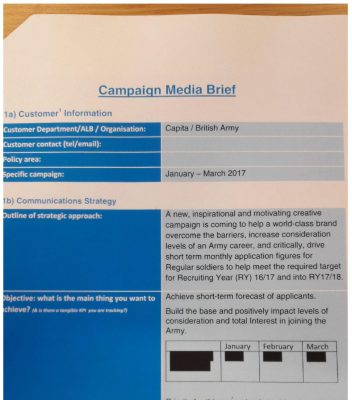Army recruitment practices exploit and widen class divisions
ForcesWatch comment

In a powerful Guardian piece (Sunday, 9 July), damning evidence was revealed demonstrating that British Army recruitment marketing deliberately targets working-class young people. While it is not a surprise that the Army are targeting economically disadvantage parts of the country, they have always denied this.
The evidence is a marketing brief attained through Freedom of Information. The brief was given by the Army, and their recruitment agency Capita, to the advertising agency Karmarama. It spells out the key target audiences for the 2017 ‘This is Belonging’ Army recruitment marketing campaign, which we discuss here.
The ‘core regular target audience’ is described as:
“16-24, primarily C2DE. Mean household income 10K. High index for social, mobile, cinema Not heavy TV viewers. Interested in sports and spending time with friends.’
The brief also makes it clear that specific areas of the UK – poorer, northern and Welsh cities – are targeted by Army recruitment
The brief also makes it clear that specific areas of the UK – poorer, northern and Welsh cities – are targeted by Army recruitment:
“Please see below for highest indexing army locations, please consider to use these across all media channels. Leeds, Cardiff, Cleveland, Belfast, Nottingham, Manchester, Doncaster, Birmingham, Sheffield, Newcastle, Liverpool.”
The Ministry of Defence has responded to these revelations both by denying the evidence of targeting and by claiming that, in fact, it provides social mobility opportunities for young people.
Make incredible friends. Embrace adventure. If you want an extraordinary job, join the Army https://t.co/AdPe3hq5cC #FindWhereYouBelong pic.twitter.com/6ZF3M9Gz8r
— Army Jobs (@armyjobs) January 14, 2017
We counter that Army recruitment both exploits and widens class division, by:
- Encouraging minors to leave mainstream education before the age of majority.
- Targeting young people from disadvantaged areas, many with experiences of childhood adversity which leave them more vulnerable to long-term struggles with violence, alcohol abuse and mental illness.
- Enticing young and impressionable people with marketing that is not representative of the realities of Army life, thus encouraging them to make an ill-informed decision. Far from having a successful Army career, many drop out or are made to leave early, facing considerable disadvantage due to having left education to enlist and having a lack of transferable qualifications.
- Recruiting minors, many of whom are from socially-disadvantaged backgrounds, and channelling them into the most dangerous and poorest paid roles.
We detail our evidence for these conclusions in this briefing, Does the military give young people a ‘leg up’? The armed forces and social mobility
We are calling for the recruitment age to be raised to eighteen, for the cessation of the exploitation of education environments for military recruitment and promtional purposes, and we will continue to critique and expose deceptive recruitment marketing and unethical recruitment practices.
As we said in response to the BBC Panorama cadet abuse investigation last week, the British Army cannot be allowed to put PR and recruitment over the welfare of young people.
See more: recruitment, recruitment age, risks, Child Soldiers International, advertising
Like what you read?
> Sign up for our newsletter or blog notifications
> Support our work – from just £2 a month










